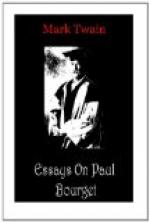Mark Twain is—
1. “Insulting.”
2. (Sarcastically speaking) “This refined humor, 1st.”
3. Prefers the manure-pile to the violets.
4. Has uttered “an ill-natured sneer.”
5. Is “nasty.”
6. Needs a “lesson in politeness and good manners.”
7. Has published a “nasty article.”
8. Has made remarks “unworthy of a gentleman.”—["It is more funny than his” (Mark Twain’s) “anecdote, and would have been less insulting.”]
A quoted remark of mine “is a gross insult to a nation friendly to America.”
“He has read La Terre, this refined humorist.”
“When Mark Twain visits a garden . . . he goes in the far-away corner where the soil is prepared.”
“Mark Twain’s ill-natured sneer cannot so much as stain them” (the Frenchwomen).
“When he” (Mark Twain) “takes his revenge he is unkind, unfair, bitter, nasty.”
“But not even your nasty article on my country, Mark,” etc.
“Mark might certainly have derived from it” (M. Bourget’s book) “a lesson in politeness and good manners.”
A quoted remark of mine is “unworthy of a gentleman.”—
These are all true, but really they are not valuable; no one cares much for such finds. In our American magazines we recognize this and suppress them. We avoid naming them. American writers never allow themselves to name them. It would look as if they were in a temper, and we hold that exhibitions of temper in public are not good form except in the very young and inexperienced. And even if we had the disposition to name them, in order to fill up a gap when we were short of ideas and arguments, our magazines would not allow us to do it, because they think that such words sully their pages. This present magazine is particularly strenuous about it. Its note to me announcing the forwarding of your proof-sheets to France closed thus—for your protection:
“It is needless to ask you to avoid anything that he might consider as personal.”
It was well enough, as a measure of precaution, but really it was not needed. You can trust me implicitly, M. Bourget; I shall never call you any names in print which I should be ashamed to call you with your unoffending and dearest ones present.
Indeed, we are reserved, and particular in America to a degree which you would consider exaggerated. For instance, we should not write notes like that one of yours to a lady for a small fault—or a large one.—[When M. Paul Bourget indulges in a little chaffing at the expense of the Americans, “who can always get away with a few years’ trying to find out who their grandfathers were,”] he merely makes an allusion to an American foible; but, forsooth, what a kind man, what a humorist Mark Twain is when he retorts by calling France a nation of bastards! How the Americans of culture and refinement will admire him for thus speaking in their name!




